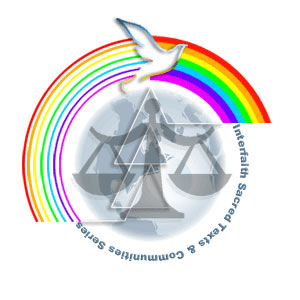|
OVERALL OBJECTIVES OF INTERFAITH DIALOGUE SERIES
1. To learn about one another's core beliefs of faith, culture, traditions and community life
2. To ask questions in dialogue that lead to greater understanding
3. To create friendships and build relationships across religious and cultural devides
4. To decrease suspicion and fear of one another
5. To be part of a process that eliminates acts of discrimination and hate against recent immigrants and persons of color
6. To contribute toward building greater respect and opportunity for people in the St Cloud area
|

INTERFAITH SACRED TEXTS & COMMUNITIES SERIES
EXPLORING
Social Justice & World Religions
SAINT CLOUD, MN
SEPTEMBER - OCTOBER 2004
WEDNESDAYS 6:00 - 8:00 PM
VISION STATEMENT
To explore the wisdom that diverse faiths bring to the common quest
for social justice by encountering texts, rituals, and exemplary individuals
from Native American, Hindu, Christian, Muslim, and Buddhist traditions.
PURPOSE
Instead of focusing on a single religion, this educational series will focus
on a single theme: social justice, based on five world religions;
Native Americans, Hinduism, Christianity, Islam, & Buddhism

The five speakers have been requested to address the following questions
in their presentations:
1) Which issues of social justice (e.g. poverty, women's rights, racial equality, human rights, nonviolence, environmental sustainability) are most emphasized in this tradition?
2) Which issues of social justice create special challenges for this tradition?
3) What practices and strategies (e.g., political action, individual charity, education, community building, nonviolent resistance, revolution) does this tradition favor for promoting social justice?
4) How (if at all) does this tradition cooperate with other faith traditions in promoting social justice?
5) Who are some of the exemplary individuals who have worked for social justice from within this tradition?
6) What are some of the exemplary organizations that have worked for social justice from within this tradition?
7) How has this tradition's approach to social justice changed over time?

TIME:
6:00 pm - 6:30 pm
Pre-dialogue session (30 minutes)
6:30 pm - 8:00 pm
Dialogue Session (90 minutes)
DATES, TOPICS & LOCATIONS

FREE & OPEN TO ALL
ALL SITES ARE HANDICAP ACCESSIBLE
|
EACH SESSION WILL INCLUDE
Invitation to Dialogue by Moderator - 3 minutes
Dr. Mary T. Howard
http://www.diversityfoundation.org/btga/1999.html
Welcome Remark by Representative of hosting institution - 3 minutes
Introductory Words by UNIITE's Executive Director - 3 minutes
Dr. Malcolm Nazareth
Opening Prayer from the religion of the day - 5 minutes
Presentation by Presenter (including use of media/powerpoint/teaching aids)- 35 to 40 minutes
Questions & Answers - 20 minutes
Closing Comment by Presenter - 5 minutes
Concluding prayer by Representative of another faith tradition - 5 minutes
Refreshments and Conversation - 15 minutes
concluding at 8 p.m.

LIST OF SPONSORS
UNIITE
Center for Interfaith Encounter
Faith Communities: Building Racial Harmony
Create CommUNITY
Central Minnesota Community Foundation
United Methodist Committee on Relief
St. Cloud Hospital
Christ Church Newman Center
St. Johns Episcopal Church
St. Cloud Technical College
Asian Students in Action, SCSU
Religious Studies Program, SCSU
Office of Continuing Studies, SCSU
Unitarian Universalist Fellowship
New Horizons United Methodist Church

Note: The fall 2004 series is different.
CIE focused on Christianity, "Christian Sacred Texts: John Gospel Diversity Fest"(summer 2000). CIE and UNIITE focused on Islam, "Muslims - Dialogues - Beliefs"(spring 2003) and Judaism, "Jews - Dialogues - Beliefs" (spring 2004). Besides, all three series were conducted exclusively at different church locations, both Protestant and Catholic. The fall 2004 series will be thematic. Academically competent practitioners of five world religions will each focus on a single topic: social justice. Some of these dialogues will be hosted by area institutions including a university, a MNSCU community college, and a hospital, and some by area churches.
Ground Rules for Dialogue
How to obtain one or two college credit(s) by participating
(Message from the Religious Studies Program director: You have to register in a very particular way: you must use the quick add link and then follow the instructions on the page carefully. Otherwise, you will not successfully add the class.)
|